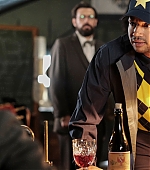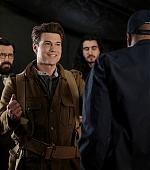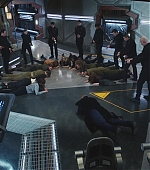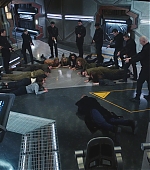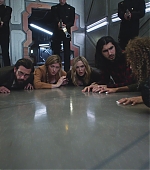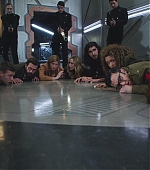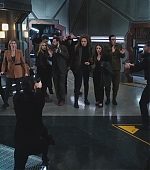Last week, I had the chance to see Matt on stage during a weekend performance of “Knives in Hens“. The play was amazing and Matt did a superb job. It was my first time seeing him on stage and I’m hoping it won’t be the last.
I got to sit down with Matt after the play for a mini interview, these were his answers.
Matt about the Play: It’s so intense and concentrated and the thing is, it’s not literal, it’s very symbolic and metaphorical and ambiguous, lots of questions are deliberately left unanswered. The play I think is very filmic, with the lighting and the pictures and the sensuality of it.
Matt about the Cast: The way we work together as actors, very early on we did a lot of physical work so that when we came to it, we’re way used to each other’s bodies. Getting used to the physicality of that so that there’s no fear for us as actors.
Matt about the Director: Our director is unbelievable, [Yaël Farber] she’s such a special human being and director.
Matt about any future projects: (smirks) Maybe.
Knives in Hens runs until October 7, so make sure to try and see him before the show runs end.
Full Interview transcript:
Matt: This play is an interesting one. What’s great about it, it’s only an hour and 30 minutes.
Interviewer: Yes, that’s really short.
Matt: Can you imagine if you had to go back in for another hour after that? No.
Interviewer: God no, it was too intense.
Matt: I’m doing it as well. It’s so intense and concentrated. The thing is, we don’t let off any release valves for the audience. There’s a few little bits where the audience laugh, which is a little bit of a release, but not many. The thing is about the place. It’s not literal. It’s metaphorical. You see that it’s very symbolic and metaphorical and ambiguous. Lots of questions are deliberately left unanswered like, “Is he sleeping with a horse or is it a woman in there?” What we do as a production is we don’t say it’s one or the other. We let the audience dwell in that ambiguity, which is nice for us, but it’s good. The director is unbelievable. Her name’s Yaël Farber. She’s such a special human being and director. There’s incense burning in there. I don’t know if you could smell the incense-
Interviewer: Yes.
Matt: -when you walk in? It’s just like when you walk in there, you feel like you’re in pre-industrial Britain. Do you know what I mean? It’s like flour going everywhere and dirt going everywhere and stuff. Yes, it’s quite an intense but beautiful metaphorical poetical play and it’s been a great experience.
Interviewer: It is great to watch.
Matt: Yes. Lots of my friends have come and they’ve said that they’ve found it– It’s not an easy watch. If you’re not very well acquainted with theater, it’s not something that you go on, “Oh, that was great. I had a nice night out of the theater.” It’s something that it takes. It does something to you hopefully, good or bad.
Interviewer: To be honest, I got a bit uncomfortable with the sex scenes but I knew it was part of it because it set the tone of how he treated her for the rest of the play.
Matt: Yes, exactly. The thing is as well, it’s pre-industrial Britain. There was bestiality in those days. People did have loving relationships with horses. With all the research you do, you look at it and that stuff did happen. Not to say it’s right or not. The thing is like with a piece like this, it’s not whether we have judgment on it, it’s about what it is. Do you know what I mean?
Interviewer: Yes.
Matt: You present the work and the time. It’s not specific in any time but it is pre-industrial. The idea of the metaphor is from the plough to the pen. When human beings started, during the agricultural age, they started to use memory different. The way that old civilizations and cultures used to tell stories, there used to be chiefs in the clans or in the tribes that would be the memory keepers, and they would be the ones who knew all the stories and had the wisdom.
It wasn’t until us as a whole global society started to write things down that we didn’t need to use that part of our brain anymore, so it freed it up for other things because we were able to write something down and put it down on record. The thing is, it shifts because there’s lots of different cultures all over the world that did that at different times from the first time.
Interviewer: It actually fits a lot, yes.
Matt: All of that stuff is just really interesting to me, doing all that research and then just working out the sensuality of the play. The play, I think, is very filmic with the lighting and the pictures.
Interviewer: Yes, the lighting played a huge role.
Matt: Yes, and the sensuality of it. The way that we worked together as actors very early on, we did a lot of physical work so that when we come to it, it’s like we’re way used to each other’s bodies. It’s not that thing of, “You can’t touch.” It’s like where everybody is touching everybody. Do you know what I mean? It’s like getting used to the physicality of that so that there’s no fear for us as actors to go, “Is it okay if I do that” You just get down and we did all this physical work that really bled into it. You can see that, I think more so with the way that Christian and Judith work. Do you know? Because they’re a couple.
Interviewer: Yes, she is amazing. I honestly don’t know her. Again, I have very limited theater background, but she was amazing.
Matt: Yes, she is. She’s so physical as well. There was a point in rehearsals where– I have an old injury in my shoulder and it had flared up, so I had a problem for about three weeks in my shoulder. We’re doing all this physical, real physical work, and then dragon sacks around. There was a whole point where, that bit when the drag in the sack, she would pick one up individually and walk like water. Those sacks are heavy like this.
I had a shoulder injury, then Christian got a shoulder injury. You look at Christian’s body, he’s a big boy. The two men are like just incapacitated and she’s walking around with sacks on her back. We’re like, “What are you doing, woman?” Do you know what I mean? She’s older than all of us.
